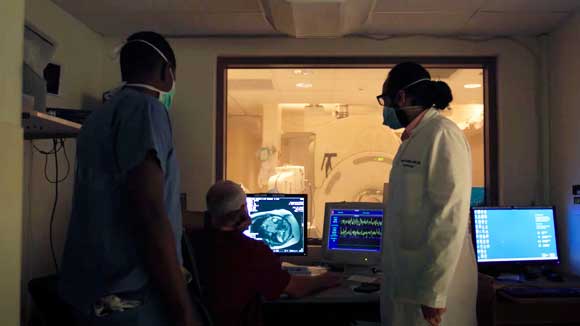Hematology/Oncology Fellowship

Program Director: Nathan Bahary, MD, PhD
Associate Program Director: Deep Shah, MD
Accreditation: ACGME
Program Length: 3 years (PGY4 - PGY6)
Fellows per year: 4
Quick guide to Hematology/Oncology Fellowship
Application Information
Curriculum
A message from the program director:
Welcome!
On behalf of the faculty and staff participating in the Allegheny Health Network Medical Education Consortium’s Hematology and Oncology
Fellowship Program, thank you for your interest in our program!
The Allegheny Health Network Cancer Institute located in the heart of downtown Pittsburgh (the city of bridges) in Western Pennsylvania. The city is located at the confluence of the Allegheny, Monongahela, and Ohio rivers and in 2015 was listed in the 11 most livable cities in the world. It is home to the modern Andy Warhol museum, Carnegie Museum of Art, The Phipps Conservatory and Botanical gardens and the Carnegie Museum of Science. For the sports fans, we are home to the Pittsburgh Steelers, Penguins, Pirates and Riverhounds.
The goal of our fellowship program is to develop the fellow’s knowledge base, attitude and skills that are needed to provide high quality state-of-the-art care to patients with hematological and oncological disease. Our faculty provides training that will allow trainees to become independent and effective consultants. We provide a wealth of experience in both an academic and community setting exposing our trainees to diverse pathologies that will provide an enriched clinical experience. We aim to inculcate traits that will foster a sense of inquiry and lifelong learning while providing fellows with a nurturing environment, camaraderie and mentorship to enhance their overall training experience.
We look forward to reviewing your applications!
- Hematology oncology training is about combining the best inpatient and outpatient experiences for fellows coupled with clinical research opportunities. At AHN we strive to achieve this balance.
- Our fellows in their first year spend a majority of their time completing their inpatient training in both solid tumor oncology and hematology and cellular therapy.
- Having a strong transplant program allows our fellows to gain experience in taking care of acute malignant hematology along with complex transplant patients and getting CAR-T therapy while also being adept at procedures (bone marrow biopsies, skin biopsies and interpretation of peripheral blood smears).
- The second year has a balance of some inpatient and outpatient rotations with increasing responsibilities in education and research along with scheduled outpatient rotations in community oncology practices to help our fellows gain experience of working in those settings in addition to our academic center.
- The final year is all outpatient and research where the fellows have the
flexibility to structure their outpatient clinics to best fit their career goals after graduation.
- The crown jewel in our training is our fellows’ continuity clinic where every fellow has their own panel of patients on Thursday mornings and precept them with a disease site specific expert faculty member. This helps them learn from the experts while seeing a diverse array of oncological diseases and following the patients through their journey over 3 years. The fellows being the primary oncologists for these patients are responsible under supervision for the entire clinical decision making and follow up care and therefore get the experience of being an independent oncologist starting week 1 in their fellowship.
- The fellowship also offers a strong didactic structure with multidisciplinary tumor boards in all disease sites in solid tumor oncology and hematology, weekly board review with attending physicians and structured lecture series.
- Our fellows participate in a variety of clinical research activities and present their work at the annual national hematology and oncology meetings. The program supports the fellows financially to attend the meetings. We have a robust clinical trial portfolio to enrich our fellows' experience with cutting edge and most up-to-date treatments.
- After graduation our fellows transition to additional fellowships, academic centers, or community practices.
- We pride in retaining many of our fellows within our own network.
Didactics and board review
The fellows are responsible for the Journal Clubs, Multidisciplinary Tumor Board Conferences, Landmark articles and Morbidity and Mortality conference along with one core lecture in their 2nd and 3rd year. Majority of the core
lectures are presented by faculty experts in that particular disease site.
The fellows have board review once a week precepted by a faculty member with an expertise in the topic being discussed.
Wellness, team-building and fun activities are arranged to foster camaraderie. Picnics in the park, monthly birthday celebrations and the end of year graduation party are some examples.
About Graduate Medical Education
The Hematology Oncology Fellowship program is part of the Graduate Medical Education (GME) opportunities offered by the AHN Medical Education Consortium. Learn more about Graduate Medical Education.
Contact us
Cynthia Salopek
By accessing this video, I understand that I am leaving the AHN website and I will be re-directed to an external website operated by a third party platform provider. I acknowledge that the platform provider may collect personal information about me, and about the video that I view, on their platform and may use and disclose this information in accordance with its privacy policy. I agree that Allegheny Health Network is not responsible for the data collection and use practices of this third party.

